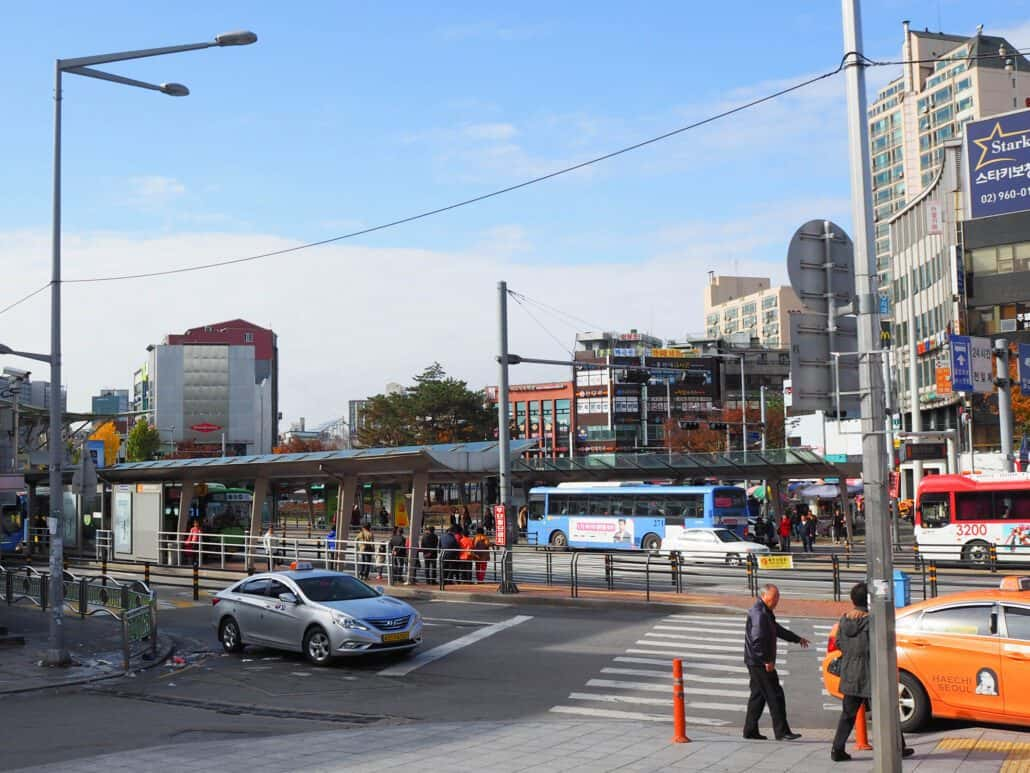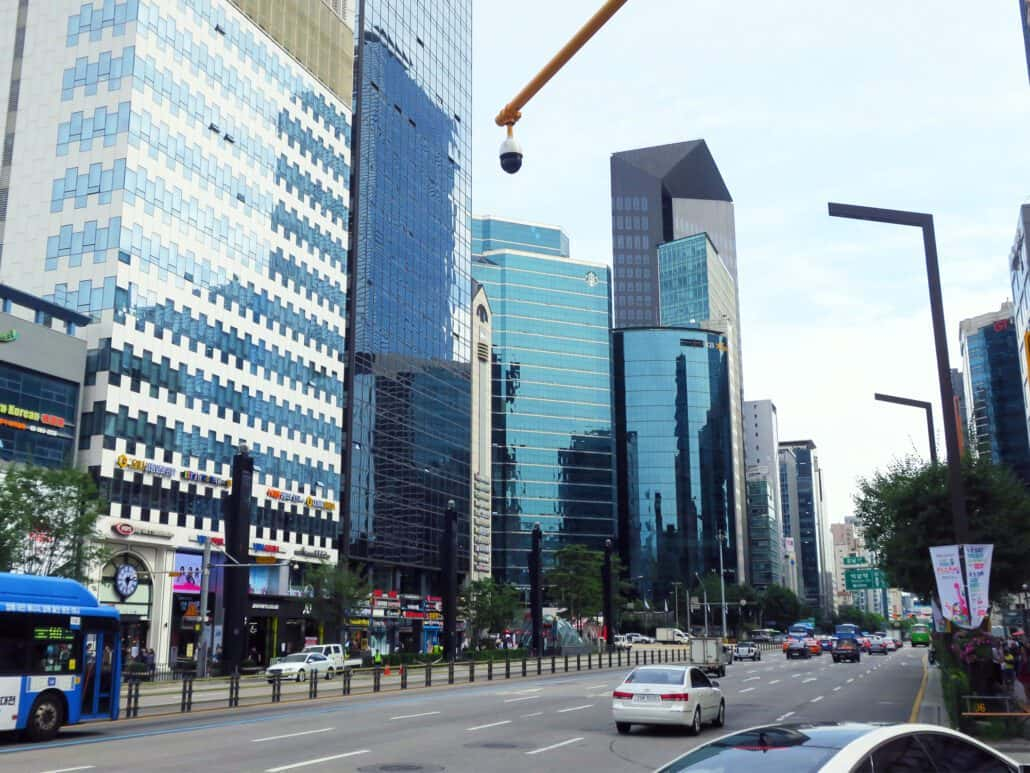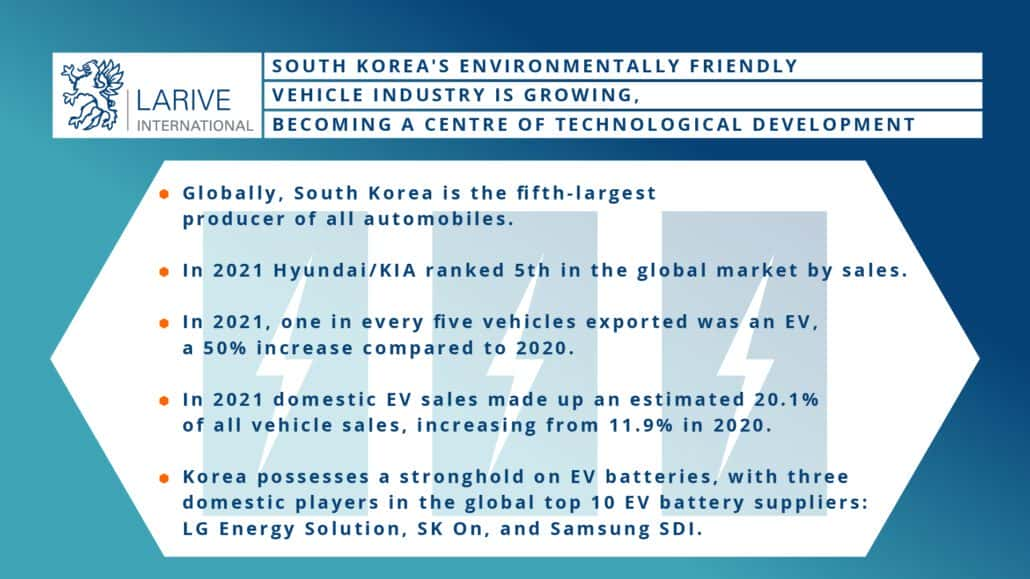South Korea’s environmentally friendly vehicle industry is growing, from e-mobility technologies and Battery/ECU/EV Motors to Charging Equipment, Thermal management, and other related components. The automobile industry in total is now at the centre of technological development, with the transition to electric vehicles and autonomous driving vehicles. Restrictions on movement, factory shutdowns and other shockwaves from the COVID-19 pandemic, which has spread across the world since early 2020, stimulated technological innovation, accelerating industrial restructuring.
This interest in Electric Vehicles (EVs) is not just a Korean market trend, but rather an ongoing global change. With governments announcing restrictions for internal combustion engines and new regulations for carbon neutrality, the EV industry is exploding. Moreover, affordable prices for EV batteries and faster EV recharge times make the EV industry ever more accessible to consumers.
Domestic Market
Globally, South Korea is the fifth-largest producer of all automobiles and projects to manufacture 2.83 million by 2025 and 7.85 million by 2030. Korea Automotive Technology Institute (KATECH) reported that in 2021 Hyundai/KIA ranked 5th in the global market by sales. In 2021, exports for EVs increased 50% and one out of five vehicles domestically sold or exported was an EV. The Korea Automobile Manufacturers Association (KAMA) and Korean Automobile Importers & Distributors Association (KAIDA) estimated that in 2021 domestic EV sales made up 20.1% of all vehicle sales, increasing from 11.9% in 2020.
The domestic market for Battery Electric Vehicles (BEVs) was a battleground between Hyundai and Tesla, but the landscape changed in 2021 when Hyundai BEV sales increased rapidly. One key reason was the Korean government’s introduction of financial incentives for purchasing EVs. Korean consumers are eligible to receive up to KRW 8 million (EUR 6,000) when purchasing an EV valued at KRW 60 million (EUR 45,000) or less. The incentive is reduced as the vehicle price increases above that amount and since most Tesla BEVs are priced above the KRW 60 million price cap, lower-priced domestic vehicles have reaped the benefits.
Korea has localized most of the automotive parts and materials supply for internal combustion engine vehicles. However, to date localization for key EV parts, such as Motors, Reducers, Batteries, Onboard Chargers (OBC), and Electric Power Control Units (EPCU) stands at less than 70%. Of these parts, the battery is the core factor of quality for an EV and covers about 20~40% of a vehicle’s raw material price. Korea possesses a stronghold on EV batteries, with three domestic players who fall in the global top 10 EV battery supply companies: LG Energy Solution (2nd), SK On (5th) and Samsung SDI (6th). In order to solidify the Korean position, there lies an opportunity for companies able to support local assembly and production of these parts.
Policies and Regulations
As mentioned above, while the government’s overall funding for EV purchasing incentives has increased, it has reduced the vehicle price cap and the amount an individual consumer is eligible to receive. This change will have a continued impact on the high-end EV market, encouraging consumer purchasing preferences for domestic or lower-cost EVs to hold.
The Korean government is also investing more in localizing and developing domestic parts and component manufacturers. In 2021, the government announced that it will support the manufacturing of 1,000 types of ‘future parts’ and components via funding initiatives for R&D, employee training, financial incentives, and support to develop production processes with smart factory benefits. In early 2022, the government announced a budget of KRW 22.4 billion (EUR 17 million) to train up to over 2,000 specialists for the industry, a 113% funding increase over 2021. Localisation of services and knowledge offers opportunities for Dutch and European businesses to establish a foothold in the dynamic Korean automobile market.
Tumultuous development
The rapid growth of the EV industry does carry a downside for some. As vehicle manufacturers reconfigure to reduce and end production of internal combustion engine vehicles by 2040, experts believe that 37% of the automotive parts and component companies may have to close.
Other risks are in the raw materials area. Price and supply chain issues for raw materials are affecting the industry. Many are concerned with Ukraine and Russia’s conflict as Russia is the largest supplier of Nickel, which is essential to EV batteries. The COVID-19 pandemic has also caused problems with the supply chain for raw materials. Unpredictable circumstances like these cause fluctuations in the price and supply chain that can affect the whole industry. In the search for diversification of suppliers, Western companies can add their expertise and products to the mix and strengthen bonds in the Korean market.
As Jun Kyu Kim (Vice President Korea Automobile Manufacturers Association (KAMA)) stated in Invest Korea: ‘After 2022, the global automobile industry is expected to go through restructuring driven by the recovery of global demand and reorganization of global value chains. Also, the trends of trade protectionism in some major countries are likely to continue. The Korean auto industry has gained experience in overcoming difficulties early on and achieving further growth while going through the financial crisis in 1997 and the global financial crisis in 2008.’
Keen to learn more about the automotive industry and EV developments in South Korea? This article was drafted with the input provided by IRC Consulting. Larive International and its South Korea-based Larive Group partner IRC Consulting are specialized in developing and implementing market entry and growth strategies. Reach out to one of our colleagues!






